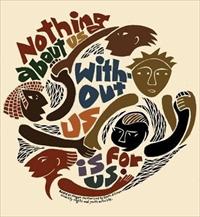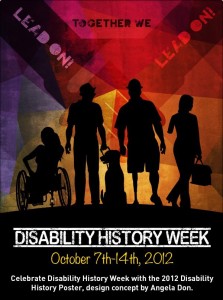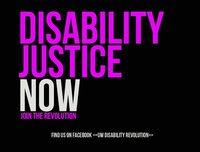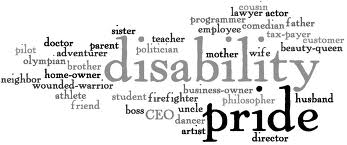Words Flow From My Fingers: In Defense of Social Media
[S]poken language is privileged over textual language. This privileging of one sense over another is not natural, as Rousseau argued, but arbitrary. — Lennard Davis, Enforcing Normalcy: Disability, Deafness, and the Body, page 67
I’ve recently been reading Lennard Davis’ Enforcing Normalcy, and I’ve been thinking a great deal about what he has to say about the privileging of speech in our culture. The bias toward speech is nowhere more apparent than in the doomsday predictions that people engage in regarding the impact of text-based social media. It seems that you can’t pick up a newspaper or, ironically enough, read articles on the Internet, without hearing someone bemoaning the rise of social media and its allegedly destructive impact on human interaction, conversation, and civilization itself.
Sherry Turkle’s New York Times piece, The Flight from Conversation, is representative. Ms. Turkle writes that we have substituted “connection” for “conversation,” and that our online communication is a mere shadow of real human interaction:
FACE-TO-FACE conversation unfolds slowly. It teaches patience. When we communicate on our digital devices, we learn different habits. As we ramp up the volume and velocity of online connections, we start to expect faster answers. To get these, we ask one another simpler questions; we dumb down our communications, even on the most important matters…
And we use conversation with others to learn to converse with ourselves. So our flight from conversation can mean diminished chances to learn skills of self-reflection. These days, social media continually asks us what’s “on our mind,” but we have little motivation to say something truly self-reflective. Self-reflection in conversation requires trust. It’s hard to do anything with 3,000 Facebook friends except connect.
As we get used to being shortchanged on conversation and to getting by with less, we seem almost willing to dispense with people altogether. (Turkle 2012)
I find these paragraphs absolutely fascinating in their alarmism. False assumptions abound: that one cannot have a text-based conversation that “unfolds slowly;” that text-based media causes us to “dumb down our communications”; that text-based media makes us less self-reflective; that one cannot build trust with people unless one speaks to them face to face; and that social media causes its users to become narcissists who wish to “dispense with people altogether.”
I will certainly grant that there are people who use social media in lightning-fast ways that don’t allow for nuanced conversation, that run rampant over self-reflection, and that erode trust. All one has to do is glance at the comment thread of any major news story and it becomes quite apparent that the Internet gives anyone the ability to say just about anything in as offensive a way as possible. But to say that textual media itself creates this kind of dumbed-down, offensive speech is to get the causation wrong. People have always said highly offensive things to and about one another, but now that anyone with an Internet connection can make it public (and create a permanent record of it), we think it’s a new phenomenon. I’ve been absolutely shocked by the level of racism, misogyny, and anti-Semitism I’ve seen on the comment threads of major news sites, but I shouldn’t be. They have always been present in our society. Before the advent of the Internet, I just couldn’t hear someone in another state say something abhorrent because I wasn’t face-to-face with him.
It’s not the medium that creates the shallowness, the bigotry, and the ignorance. The medium just makes them more apparent. And yes, that’s depressing, but it’s not a sign that the world is in more of a mess today than it was yesterday.
Of course, if one looks past the cesspool of the comment threads of major news sites, one can find a plethora of very nuanced, very sensitive, and very supportive conversations that happen online. In fact, a number of people find substantive conversations through email and social media welcome and meaningful because these kinds of conversations simply aren’t available to them in their everyday lives. Many people find themselves isolated in their local communities: LGBT people, genderqueer people, disabled people, parents of disabled kids. In many places, there simply isn’t much support on the local level for people in minority communities, particularly if you live outside the major cities.
Social media serves to erode this isolation. In fact, it can have an empowering impact on people’s lives. I live in a small town in rural Vermont. I don’t know many disabled people locally, because the place I live is so sparsely populated. For disabled people, finding disabled peers is crucial, just as for people in any other minority, because we share common experiences, common perspectives, and common concerns. We see similar injustices and we experience similar levels of outrage about them. We get sensitivity and understanding from one another regarding verbal and physical pacing, the content and amount of speech to use, the kinds of barriers we find in public spaces — sensitivity and understanding that are often absent in our experiences of our nondisabled peers.
In my small town, I know half a dozen disabled people, and I value their friendship immensely. But if I weren’t connected with the larger disability community online, I would not feel the sense of belonging in the world that I do. I would not have learned so much about the political and social nature of disability, and I would not have gained so much insight about how to adapt to disability, about how to be proud, about how to advocate for myself, and about how much support I can give and receive. When I’m struggling with an issue, I can post a Facebook status and have a thorough-going, nuanced, supportive conversation. I can email an online friend and gain perspective that might elude me with an able-bodied person who does not share my experience. I can have conversations that go on for days, in which each party takes plenty of time to reflect in silence and to craft a response that speaks to the heart of what is going on.
One of the most painful things to me about the privileging of verbal communication is that verbal speech is not my native language. Because I come across as being an articulate person, most people do not realize how much of an effort it is for me to speak. I have to gather almost all of my energies to do it, and I need a great deal of time to recharge afterward. Speech is my second language; I will never feel completely at ease in it.
My first language is text. At three years of age, I had only been speaking for six months, but I could read anything. I don’t remember ever learning to read. My mother told me that I saw her reading one day and asked her what she was doing; she explained to me that each letter had a sound and that the sounds made words. From that point on, I learned to read like other children learn to speak — not with rote lessons and phonics exercises and vocabulary lists, but intuitively. I knew what the words meant; I knew their relationship to the words I could hear; I knew how to put them together and roll them around in my head and see the sentences take shape in my mind’s eye.
Words flow from my fingers the way that speech flows from the lips of speaking people, the way that words flow from the hands of Deaf people, the way that rhythm flows from the hands of a drummer.
And yet, the mode of communication in which I am most effective is seen as a threat to human interaction and mutual care. Such concerns are not new. As Lennard Davis points out, the eighteenth century saw the rise of solitary reading as a leisure time activity and the diminution of public performance as a communal past-time. Davis writes about the rise of textual media in a way that resonates into the electronic age:
Writing and reading became the dominant forms of using sign language, the language of printed signs, and thus hearing readers and deaf readers could merge as those who see the voice of the words….The very nature of political assent, through the silent decoding of reading, became a newly ‘deafened’ process that did not require adherents to gather in a public place, that did not rely on a vocal response to a rallying cry. (Davis 1995, 62)
Much like today’s social media platforms, which allow people separated geographically to unite in political causes and find like-minded souls, reading in the eighteenth century enabled people to gather together with fellow feeling in the privacy of their own living rooms. Over two hundred years ago, the response to this shift was a “fascination with conversation” that was, in fact, “a kind of cultural nostalgia for a form that was in the process of becoming anachronistic” (Davis 1995, 63). The parallels with Sherry Turkle’s encomium on verbal conversation could not be clearer.
Those who privilege spoken language do not recognize its limits, nor do they see the potential for human belonging that social media provides. Last year, I found the following moving words in a comment on my Journeys with Autism blog from someone who called himself invisible:
I can’t believe the tears I’ve shed today….
I recently lost my dearest and best friend. Each of us found a connection that we had never had with another person. We instinctively understood and accepted each other. I’m in my late forties. I never felt like I was a part of the rest of the world, I thought that’s how everyone felt. I just accepted that nobody would understand me, that nobody would ever see the real me. That is, until he came along…
I read a few things that you wrote, and it was like I was reading my own thoughts… I just keep crying. Are there really other people like me? Is this possible? (Journeys with Autism, February 2, 2011)
This man had felt so alone in his life that he believed that only one other person could see him and understand him, and he was in despair because he had lost that person. And then he read the words on my blog, and he wept for joy that there were others who felt as he did — not just me, but so many of my readers.
For many, many people in this world, being seen and being understood is a rare occurrence in their local communities. The Internet and the social media it makes possible bring people together, from all over the world, who have felt isolated in the places they live. The friendships that I have made online are just as real, just as loyal, and just as profound as those I have made face to face. And when I do meet up with my online friends face to face, we talk as though we’ve known one another for years.
Because, in fact, we have.
References
Davis, Lennard J. Enforcing Normalcy: Disability, Deafness, and the Body. London, England: Verso, 1995.
Journeys with Autism. “On My Solitary Way.” http://www.journeyswithautism.com/2011/02/02/on-my-solitary-way/. February 2, 2011. Accessed December 9, 2012.
Turkle, Sherry. “The Flight From Conversation.” The New York Times, April 21, 2012. Accessed December 9, 2012. http://www.nytimes.com/2012/04/22/opinion/sunday/the-flight-from-conversation.html.
© 2012 by Rachel Cohen-Rottenberg









Lucy Berrington
12/10/2012 | 2:31 am Permalink
This is fabulous, Rachel.
Rachel Cohen-Rottenberg
12/10/2012 | 3:12 am Permalink
Thank you, Lucy!
The Nerd
12/10/2012 | 10:28 am Permalink
Thank you for sharing your perspective.
Having ADHD, I prefer text because it’s there for me on my time. If my mind wanders, I don’t have the panic of possibly having missed something. When communicating, I can make a greater effort to match my written words to my thoughts, rather than things simply coming out of my mouth in real-time.
I especially appreciate your thoughts on community-building through text-based venues. I would absolutely be the only genderqueer person I know if not for the dozens I’ve met online. It was agony being the only one. Now I feel a healthy sense of community.
Rachel Cohen-Rottenberg
12/10/2012 | 10:43 am Permalink
I have a genderqueer kid, and ze has found so much support and insight online. I know how indispensable it is. I’m so glad you have found your community!
The Goldfish
12/10/2012 | 8:27 pm Permalink
This is brilliant, Rachel.
I’m able to leave the house so rarely, and find it extremely difficult to make friends off-line – I might have a friendly conversation with someone, but if we don’t see one another for months until I next leave the house, we’re not likely to grow close. But I have friends on-line who I “see” and interact with every week.
Some of those friendships are extremely casual indeed, but others run deep. When my marriage broke down, I went to live with one of them. I’m now living with and engaged to another. It is now fairly common for folks to find love on-line, and that’s not done with shallow “dumbed-down” conversations.
This on top of the way that the medium provides accessible community in all the ways you describe. Like you, I can be far more articulate, with much less effort, with time to think and write things down. I think, if anything, this increases self-reflection. Sometimes I write things down and think, “No, I thought I believed this, but now I’ve put it down, I realise my mistake…”
When folks talk about on-line communication in this alarmist way, I can only think they are looking in all the wrong places.
Rachel Cohen-Rottenberg
12/11/2012 | 12:25 am Permalink
I thoroughly relate to what you’re saying about communicating using text. It allows me to engage in far more self-reflection than talking does. I do exactly what you do — when I write something, I examine it and see whether there is a flaw in my thinking, or whether it matches the feeling I’m having. It’s much harder to reflect on my words in a face-to-face conversation, especially in a world that is so rushed.
chavisory
12/11/2012 | 3:39 pm Permalink
Yup–the pressure to be able to respond immediately in spoken language almost guarantees that whatever I’ll say *won’t* be the most true or reflective version of whatever I want or mean to say.
Bob Rottenberg
12/10/2012 | 10:20 pm Permalink
As with so much else in the world, the problem you’re addressing is the simplification of anything, that produces a generalization that denies the existence of subtle difference. So everything that is great about face-to-face communication can also be great about on-line communication. And vice versa. There are plenty of people who are willing and able to take the time for the in-depth contacts you talk about, both in person and on line. And there are plenty of people who are too rushed, in person or on line, to really listen and respond from a deep place. After all, the “medium” (whether face-to-face or via some kind of screen) is only that: a medium. The real message comes from the ways we use the medium. As you’ve said so well, real communication involves much more than simply tossing words back and forth like a ping pong game…
Rachel Cohen-Rottenberg
12/11/2012 | 4:44 pm Permalink
What you say makes me realize how much people idealize face-to-face conversation — as though before the Internet, we were all wonderful conversationalists eager to engage in lots of thoughtful discussion that resulted in personal growth and emotional reciprocity. The first 30 years of my life happened before the Internet became accessible to the average person, and I don’t remember meeting a lot of people who had these skills. And these days, as you and I have noticed, many people who do communicate face-to-face don’t seem to be able to engage in back-and-forth conversation. There seems to be a certain nostalgia here for a time that never happened.
Andrew Dell'Antonio
12/11/2012 | 12:28 am Permalink
Rachel, thanks for your insights, as always. As you point out, the influence of online communication can cut both/several ways: for quite some time I read boards and was on e-groups that advocated various flavors of “autism cure”, and the self-reinforcement among those groups is remarkable. I feel fortunate that I then stumbled on some neurodiversity-advocacy sites and gradually pulled myself out of the curebie mentality, and now I rely greatly on my growing network of Autistic (and other disabled) advocates to learn to be the best possible ally to my daughter, and try to gradually unlearn the deep ableism that still haunts me. So reinforcement is great, but if the wrong ideas are reinforced, it’s also easy for it to lead to myopia (and I know you’ve encountered closed-thinking fostered by online reinforcement).
But I also relate to your “speaking as a second language” comment, even though I’m nominally “neurotypical,” since written language comes much more easily to me (though as a university professor, I’ve learned to do lecture-speech well, but one-on-one is still not as easy for me; that may come from English actually being my second language, and having a tendency to talk very fast and stutter some because I have kept some of the speech-cadence of Italian, though not a clear accent – who knows). And this means that electronic communication has always been my preferred medium … and I thank you for your impassioned defense of it, and your unpacking of the spurious arguments against it.
Rachel Cohen-Rottenberg
12/11/2012 | 4:48 pm Permalink
You are so right — the dangers of creating an online echo-chamber for one’s assumptions are vast. Of course, they’re equally vast in the world at large. Anyone can cocoon themselves and refuse to listen to anyone who disagrees. With the Internet, at least, one has more access to these echo-chambers and can bring in outside opinions, even if it means getting banned immediately for doing so.
chavisory
12/11/2012 | 3:36 pm Permalink
Thoughts on some of Turkle’s piece…
“To get these, we ask one another simpler questions; we dumb down our communications, even on the most important matters…”
On the contrary, I have conversations online, both with people I’ve never met in person and people I’ve known in real life for years, of a depth and range and complexity that I rarely get to in face to face conversation, both because of my erratic work schedule and difficulties with spoken conversation.
“And we use conversation with others to learn to converse with ourselves. So our flight from conversation can mean diminished chances to learn skills of self-reflection.”
Uh, wrong. Engaging in spoken conversation, for me, is almost mutually exclusive with engaging in self-reflection, unless it’s very relaxed conversation with someone who I’m utterly comfortable with. Otherwise, the social demands of spoken conversation preclude indulging the energy demands of self-reflection. Being able to have an in-depth conversation in text, not in real time, is a huge advantage for my self-reflective abilities.
It’s stunning to me that someone would assess connection as less valuable or important than conversation. I went so long without significant connection to others, and the internet has given me so much connection to other people who have made my life richer and better…it’s just mind-boggling to me.
Rachel Cohen-Rottenberg
12/11/2012 | 4:58 pm Permalink
I agree, chavisory. I think that when Turkle talks about “connection,” she’s talking about connections that don’t seem to have a lot of substance, such as when people post memes or send each other short text messages. In fact, she seems to think that posting non-substantive stuff is what everyone does on the Internet — which is, of course, completely untrue. Plus, she completely ignores the fact that people who talk face-to-face connect over non-substantive things all the time; small talk and socializing consist largely of non-substantive contact. People don’t usually talk in order to get at substance; they just talk in order to connect with other people. It astounds me that she could see any difference between the talking that people do all the time out in the world and the ways that people connect on Facebook.
Belfast
12/16/2012 | 9:20 pm Permalink
chavisory wrote:
“Yup–the pressure to be able to respond immediately in spoken language almost guarantees that whatever I’ll say *won’t* be the most true or reflective version of whatever I want or mean to say.”
I couldn’t have put it so succinctly, but I totally agree. However, for me, that is most intensely, acutely agonizingly the case with strangers (!) in public (!)-aaargh.
The better I know someone (*and* vice versa, definitely), the more I feel able to say-though not necessarily *having* to say a lot in order to convey much (thanks to pre-existing, shared meanings).
Also agree with how Bob put it, about how there are advantages and disadvantages to both kinds of communication-and the profile for those pros & cons will differ with each individual.
Internet metaphor (lest it seem I’m tangenting):
One could say that as newspapers proliferated, people could publish things that would never have been read by distant people otherwise (for good and for ill). Reporting on (such as celebrity gossip) and examples of (such as printed lies) “bad” behavior would depict “goings-on” that one wouldn’t be aware of, save for the existence of & access to the newspaper.
People gossiped about celebrities and made false claims before newspapers, though the papers provided venue where more people could find out about these things, which helped in making such instances of bad behavior seem more ubiquitous due to increased visibility (preserved for posterity, being “on the record”/”in the books”).
Rachel, your post makes more great points than I can address (exceeds my ability to respond comprehensively-but that’s a compliment), and the comments are additionally articulate in noting things I would’ve wanted to mention/agree with.